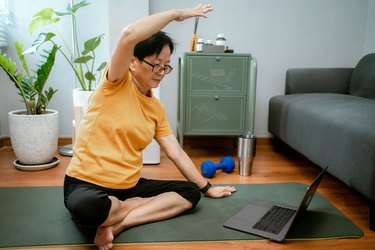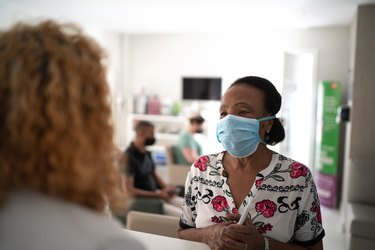
As we grow older and our day-to-day responsibilities pile up, our social lives are usually one of the first things to take a backseat to other priorities considered more important or urgent in the present moment.
"Many folks just over 50 may be the primary caregiver of their aging parents and still engaged in full-time careers, while also contributing to their grown children's wellbeing, who might be in college or getting married," Brian Dunn, LCSW, clinical liaison for Connections Wellness Group in Texas, tells LIVESTRONG.com. "All of these factors can become barriers to an individual utilizing resources for their own self-care, including interacting with the support system they've leaned on for years."
Video of the Day
Video of the Day
Aging adults are also more likely to lose loved ones to death or divorce, leaving them alone to complete tasks and chores and transport themselves, Dunn adds, leaving even less time and energy to nurture their relationships.
The pandemic has added another layer of challenges to building and maintaining social networks.
"There was and continues to be hesitation to participate in activities or groups that once felt comfortable," says Virginia-based licensed clinical social worker Alicea Ardito, LCSW. "The availability of programming and opportunities for social engagement outside of the home changed or disappeared altogether."
By the time you're ready to reconnect with others, the dynamics of your original support system may have changed so much that you're left starting from scratch. "This can be exciting, but also overwhelming," Dunn says.
One way to get through it? Focus on the health perks.
There are fundamental needs that are always constant and must be met throughout our lives, and social connection — the psychological need for love and belonging — is one of them.
"Having a solid social circle or network can be critical for older adults' overall wellbeing," Ardito says. "Social engagement provides opportunities for connection, activities and lifelong learning, all of which can increase resilience and adjustment during the aging process and help to reduce the risk of depression, isolation and loneliness."
Conversely, there's a relationship between a lack of social connectedness and the risk of depression and cognitive decline, mostly due to the fragility and vulnerability of a person's health and independence.
"A person who's used to a certain quality of life may experience either a significant medical event or gradual decline that changes their ability to maintain their day-to-day," Kosta Yepifantsev, senior care advocate and president of the Tennessee-based long-term care company Home Caregivers, tells LIVESTRONG.com. "As a result, a sea change occurs in how they interact with their support systems and precisely the type of support they receive."
Say an aging person doesn't maintain those relationships and decides to go it alone: Attempting to manage your health and potential disability without the assistance of trusted people around you can "lead to adverse physical health outcomes and put significant strain on your mental health through elevated stress levels," Yepifantsev says.
This can create an endless feedback loop where mental health negatively affects physical health and vice versa. Older adults with heart disease have higher rates of depression, for instance, and untreated depression in an older person with heart disease can negatively affect the disease's outcome.
Related Reading
How to Create Your Own ‘Healthy Aging’ Community

Building a supportive social circle starts with developing an overall lifestyle plan that hinges on healthy aging and can be implemented gradually as you're ready or as specific needs arise — that includes deciding in advance who you want to share these aspects of your life with.
"These clearly defined relationships will give you peace of mind and the opportunity to effectively live with the level of independence you desire for as long as possible," Yepifantsev says. "They'll also help alleviate any confusion, urgency or fears that might arise should your needs change in the future."
As for how to piece together this proactive lifestyle plan so you can age in place and thrive, these are the most important steps experts recommend you take.
1. Take Inventory
To know how to strengthen your social circle, you first need to know where it currently stands. One way to do this is to track your social interactions for a week or so using the mnemonic FITT.
- Frequency: How often does interacting with this person or group happen? Daily, weekly, monthly?
- Intensity: What is the quality of this interaction? Are they a best friend? Do they uplift you? Drain you? Are the conversations superficial or deep?
- Time: How long was this particular interaction? Five minutes? Two hours?
- Type: What type of interaction was it? A family get-together? A virtual coffee with a co-worker? A volunteer gig? A quick texting session?
A bird's eye view of your day-to-day interactions can help you determine which relationships deserve to be nurtured versus modified.
"When loaded down with challenges and stressors, we often feel that something's off balance yet can't quite pinpoint what," Dunn says. "But once ways to regain some emotional balance have been identified, you can more easily move towards problem-solving and creativity to build social circles and utilize current communities for support."
2. Define Your Pain Points
Do a self-inventory of the current stressors you're experiencing and how they're messing with your health. Does comfort food take center stage on the menu? Are workouts the first thing to get knocked off your calendar when you're crunched for time? Do you have hobbies you want to try but keep talking yourself out of going for it? Are there specific worries about the future you lose sleep over?
"Being overstressed without healthy self-care behaviors and activities results in emotional imbalances and our resilience meter drops considerably," Dunn says. "In this state, people typically turn to their addictions and indulgences to feel better, if only to gain some physical or emotional comfort."
On the flipside, take note of the health and lifestyle habits that never slip through the cracks no matter how chaotic your day. "This personal assessment can be of great use to gain perspective on your abilities and individual strengths," Dunn says.
You can then use this data to define who's best to include as part of your support system — and ways you can be a reliable part of theirs in return.
3. Rally Your Team
Returning to your social circle data: Take stock of the strengths and interests of the people in your support system. Do they thrive in areas you're struggling with?
Reach out to them and see if you can swap strengths — for helping you with your pain points, find out what you can do to return the favor. Your niece or nephew might help you stay on top of technology changes, for instance, and in return you could help them with transportation.
You could also seek out those in your friend group who share in your struggles and start a group text to provide ongoing support and motivation to each other.
"When we find our place to contribute, that's when we experience purpose and meaning," Dunn says. "When we allow ourselves to receive help from others, we reciprocate that need for community."
4. Have Backup Plans on Standby
Sometimes the people in your support system will "find themselves unable to lend the level of support necessary while maintaining their own personal and professional lives," Yepifantsev says.
Having a backup plan on standby (say, if your sister's not available to drive you to the supermarket, you'll have Instacart deliver your food or Meals on Wheels America help with meals instead) increases self-efficacy and contributes to emotional strength.
Depending on the specific help you need, the U.S. Administration on Aging and Habitat for Humanity have search engines that will help you find quality resources in your area.
5. Join Support Groups
Loneliness is the distressing feeling of being alone or separated, but being around other people doesn't necessarily solve the problem — you can live alone and not feel lonely, and you can feel lonely while you're spending time with other people.
This is especially the case if you have chronic illnesses your support system or society at large don't understand or dismiss, such as myalgic encephalomyelitis/chronic fatigue syndrome, fibromyalgia and long COVID.
Finding a support system online specific to your conditions can help nurture your emotional health in ways even the most well-meaning person in your social circle won't be able to.
Great places online to find your people include Meetup, PatientsLikeMe and Twitter (using hashtags like #NEISVoid and #MentalHealthVoid, as well as hashtags specific to your condition, such as #MECFS, #Fibromyalgia and #LongCOVID).
"When I tell clients to think back to a time when they felt in balance (healthy, happy, strong), they can usually identify certain hobbies and activities (in-person and online classes, book and recipe clubs, knitting guilds and walking groups) they've always enjoyed and found emotionally recharging," Dunn says.
Getting back into these interests can increase autonomy and feelings of purposefulness, as well as give you a chance to explore social connections with new people.
7. Volunteer
Volunteer time with an organization or group whose mission you support.
"There are in-person and virtual ways to share your time and passions with others," Ardito says. "Volunteer work is an excellent way to create meaning and purpose in your life while engaging with other volunteers or staff."
This can lead to a reduction in stress and anxiety, further decreasing your risk of future health problems, such as heart disease, stroke and depression, according to the Mayo Clinic.
To scope out the volunteer opportunities in your area, visit VolunteerMatch and type in your location.
8. Connect With Others Alone
If you're more of an introvert and need to spread out your human interaction to avoid burning yourself out, you can still enjoy the less draining perks of socializing through online videos, a la group workout videos, cooking tutorials and roundtable discussions.
This form of interacting with others may be one-sided but can still influence your emotional state in a positive way, according to a January 2019 study in the journal Social Psychological and Personality Science.
Researchers found we mirror the emotions of the people we see online (better known as "contagion") — so if you watch a YouTube video where the person uses a positive tone or acts passionately about their interests, there's a good chance you'll leave that interaction feeling the same way.
9. Find a Doctor You Can Trust
No healthy aging support system is complete without a doctor you click with.
"Find a doctor you trust so you feel comfortable being vulnerable and honest with them," Nehal Gheewala, DO, Florida-based geriatrician at ChenMed, tells LIVESTRONG.com. "The better your doctor knows you, the better equipped they are to help you reach your personal health outcomes."
For instance, they can look over any illnesses you currently have or that run in your family to determine how they might make it hard for you to take care of yourself or get around in the future, then help you map out specific preventative measures you and your support system can accomplish together.
Start the process by making a list of the qualities that matter to you in a doctor (Gender? Languages? Individual or group practice? Hospital affiliations? Proximity to your home? Telehealth? Accommodations?), then reach out to your friends, relatives and co-workers to find out which doctors they've had good experiences with and what exactly made their interactions so positive.
You can also find doctors in your area through the American Medical Association's Doctor Finder website and the American Board of Medical Specialities' Certification Matters database, and Google each doctor to scope out patient reviews.
Learning exactly what made other people's interactions so positive (or abysmal) will streamline your search considerably. Plus, the more options you have, the more likely you'll be to find a doctor that's both available through your insurance and accepting new patients.
10. Don’t Keep Score
"Once your social network is established, it can be important to remember healthy relationships require reciprocity — a give-and-take between the people involved," Ardito says. "Rarely are relationships completely equal or balanced."
Sometimes you'll be the one giving support and other times you'll be the one receiving it. Things like checking in on each other regularly, following through on your commitments to each other and leading with empathy when the other is in crisis are the core building blocks of a strong bond. No scorecard required.
Socialize in ways most authentic to you that are accommodating to your physical and emotional needs. Things like chronic pain, sensory sensitivities, energy deficits, not to mention health-related factors that put you at higher risk of COVID-related complications, can translate into having less social bandwidth than the average person. Honor that.
By going past that threshold, you risk social interactions becoming a detriment to your health, potentially leading to negative outcomes like chronic stress and anxiety, fatigue and emotional and cognitive exhaustion, according to an October 2020 study in Social Psychiatry and Psychiatric Epidemiology.
Apps like Rave, Marco Polo and Airtime allow you to hang out with your people in the ways that suit you best in the moment. With Rave, you can binge-watch shows together from your own homes; Marco Polo, converse even if your schedules or energy levels don't match up; Airtime, meet new people who share similar interests and interact however you're most comfortable — message or video, or simply as an observer.
- American Journal of Lifestyle Medicine: “The Connection Prescription: Using the Power of Social Interactions and the Deep Desire for Connectedness to Empower Health and Wellness”
- Mayo Clinic (MC): “Friendships: Enrich your life and improve your health”
- MC: “Helping people, changing lives: 3 health benefits of volunteering”
- National Institute on Aging (NIA): “Aging in Place: Growing Older at Home”
- NIA: “How to Find a Doctor You Can Talk To”
- NIA: “Loneliness and Social Isolation — Tips for Staying Connected”
- Social Psychiatry and Psychiatric Epidemiology: “The moderating role of social network size in the temporal association between formal social participation and mental health”
- World Health Organization: “Mental health of older adults”
- Social Psychological and Personality Science: "Multilevel Emotion Transfer on YouTube: Disentangling the Effects of Emotional Contagion and Homophily on Video Audiences"
Is this an emergency? If you are experiencing serious medical symptoms, please see the National Library of Medicine’s list of signs you need emergency medical attention or call 911.


